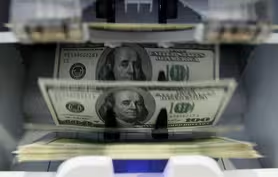
What sustainable aviation fuel means for airline emissions
Clip: 12/23/2023 | 5m 40sVideo has Closed Captions
What sustainable aviation fuel means for the future of airline emissions
Studies estimate that air travel accounts for about 4 percent of human-induced climate change, and the UN warns that airplane emissions will triple by 2050. The aviation industry’s quest to cut emissions recently took a step forward with the world’s first airliner flight using completely sustainable fuel. The Washington Post’s climate solutions reporter Nicolás Rivero joins Ali Rogin to discuss.
Problems playing video? | Closed Captioning Feedback
Problems playing video? | Closed Captioning Feedback
Major corporate funding for the PBS News Hour is provided by BDO, BNSF, Consumer Cellular, American Cruise Lines, and Raymond James. Funding for the PBS NewsHour Weekend is provided by...

What sustainable aviation fuel means for airline emissions
Clip: 12/23/2023 | 5m 40sVideo has Closed Captions
Studies estimate that air travel accounts for about 4 percent of human-induced climate change, and the UN warns that airplane emissions will triple by 2050. The aviation industry’s quest to cut emissions recently took a step forward with the world’s first airliner flight using completely sustainable fuel. The Washington Post’s climate solutions reporter Nicolás Rivero joins Ali Rogin to discuss.
Problems playing video? | Closed Captioning Feedback
How to Watch PBS News Hour
PBS News Hour is available to stream on pbs.org and the free PBS App, available on iPhone, Apple TV, Android TV, Android smartphones, Amazon Fire TV, Amazon Fire Tablet, Roku, Samsung Smart TV, and Vizio.
Providing Support for PBS.org
Learn Moreabout PBS online sponsorshipJOHN YANG: Studies estimate that air travel alone accounts for about 4 percent of human induced climate change, and the United Nations warns that airplane emissions will triple by 2050.
Last month, the aviation industry searched for ways to cut emissions took a step forward with the world's first airline or flight using completely sustainable fuel.
Ali Rogin tells us what it means for aviation and for climate change.
ALI ROGIN: A plane running on fat and sugar.
It sounds fanciful, but it's what powered Virgin flight 100 last month.
The flight was just a one time demonstration and there were no passengers, but it was meant to show the potential of what's known as sustainable aviation fuel.
On average, SAF emits 70 percent less carbon dioxide than standard fuel.
That could make a big difference for airlines which emit more carbon than any other form of transportation, all told about 800 million tons of it across the industry last year.
But decarbonizing these high speed jets is slow going.
Nicolas Rivero has been reporting on the issue for The Washington Post.
Nicolas, thank you so much for joining us what exactly was fueling this flight?
NICOLAS RIVERO, The Washington Post: In this case, it was a mixture of sustainable fuels that was made from waste fats and kind of plant sugars.
And all told they made it about 70 percent less carbon than standard jet fuel wood.
ALI ROGIN: How does this type of fuel get made?
NICOLAS RIVERO: So sustainable aviation fuels are a really broad category of fuels that can be made from a lot of different sources.
The main thing is they're not made from petroleum, but they might be made from crops like corn and soybean, they might be made from used cooking oil, they could be made from sewage or municipal waste.
The key part of their definition is I wonder what they are.
They're not made from petroleum, and they've made at least 50 percent less carbon than standard jet fuel.
ALI ROGIN: And what is needed to get this fuel made in addition to I would imagine a lot of money.
NICOLAS RIVERO: One of the issues with this right now is there's very little sustainable aviation fuel in the markets.
Part of the reason for that is there's just not that many facilities that produce these fuels, because traditionally, they've been more expensive than standard petroleum based fuels.
Not that many incentives for airlines to use them.
Airlines operate on very small margins.
And so differences in fuel costs can make a really big difference to their bottom line.
ALI ROGIN: To what extent are airlines using sustainable aviation fuel already?
Is it already part of the mix of energy that planes are using?
NICOLAS RIVERO: It is part of the mix.
It's a tiny part of the mix.
So last year airlines used 15 million gallons of sustainable fuel, which is less than a fifth of a percent of the overall consumption of jet fuel in the US.
ALI ROGIN: So what then is keeping commercial airlines from using more of it?
Why isn't it used more widely?
What are some of the barriers to that?
NICOLAS RIVERO: I mean, cost is the biggest thing.
And the way that you bring down costs is you scale up production.
And so there's some efforts to make that happen right now, but it has been slow going so far.
But governments and businesses are trying different tactics to try to ramp up some of this production.
So for instance, in the U.S., the Inflation Reduction Act gives tax credits to airlines that buy sustainable fuels to try to offset a little bit of that cost premium.
And Europe, regulators are just mandating that airlines use these fuels.
So by 2025, all airlines must use 2 percent SAF, a stable fuel, and by 2050, that ramps up to 70 percent.
And then on the market side, the World Economic Forum is leading an effort to create tax credits based on sustainable fuel purchases.
So airlines know how much carbon they're saving based on using these fuels.
And they can sell emissions credits to business travelers who might want to offset some of the carbon emissions that come from flying.
ALI ROGIN: What about the airline's themselves?
What is the appetite for them to adopt this sustainable fuel more broadly?
NICOLAS RIVERO: Airlines certainly want to use these fuels, the obstacle really is costs.
So they have to be able to justify spending double or triple or quadruple the amount on fuel that they're used to.
But they certainly see this as part of their route to getting to zero emissions.
Now, for them to get all the way down to zero, they're going to have to use new technologies that allow planes to run on things like electric batteries, or green hydrogen or some other form of fuel that hasn't been invented yet.
But those technologies are going to take years to develop and decades more for airlines to replace their existing fleets with planes that use these new technologies.
So in the meantime, the best route that airlines have to reduce the carbon emissions from their fuel is through the sustainable fuels that will emit something between 50 percent and 80 percent less carbon than petroleum based fuels that they typically use today.
ALI ROGIN: The trade organization for the airlines wants to reduce net zero emissions among its members by 2050.
Is that feasible and can sustainable aviation fuel get these airlines there?
NICOLAS RIVERO: Based on my reporting, the experts that I've talked to think that that is an achievable goal, but one that will be very difficult for airlines to reach.
So they really have to rely on some of these new technologies panning out whether that's electric planes or hydrogen fuel plants, for them to reach net zero by 2050.
In the intermediate time, the only route they really have to reduce their emissions in a significant way is scaling up their use of these sustainable fuels.
ALI ROGIN: Nicolas Rivero with The Washington Post.
Thank you so much for breaking this down for us.
NICOLAS RIVERO: Thank you so much for having me.
As communities test basic income, here’s how one city fared
Video has Closed Captions
Clip: 12/23/2023 | 7m 21s | As communities test basic income programs, here’s how one California city fared (7m 21s)
‘Live to 100’ explores people in ‘blue zones’ live longer
Video has Closed Captions
Clip: 12/23/2023 | 7m 16s | ‘Live to 100’ explores why people in ‘blue zones’ live longer than average (7m 16s)
News Wrap: Israeli forces near ‘full’ control of north Gaza
Video has Closed Captions
Clip: 12/23/2023 | 2m 29s | News Wrap: Israeli ground forces near ‘full’ control of northern Gaza (2m 29s)
Providing Support for PBS.org
Learn Moreabout PBS online sponsorship
- News and Public Affairs

FRONTLINE is investigative journalism that questions, explains and changes our world.

- News and Public Affairs

Amanpour and Company features conversations with leaders and decision makers.












Support for PBS provided by:
Major corporate funding for the PBS News Hour is provided by BDO, BNSF, Consumer Cellular, American Cruise Lines, and Raymond James. Funding for the PBS NewsHour Weekend is provided by...



